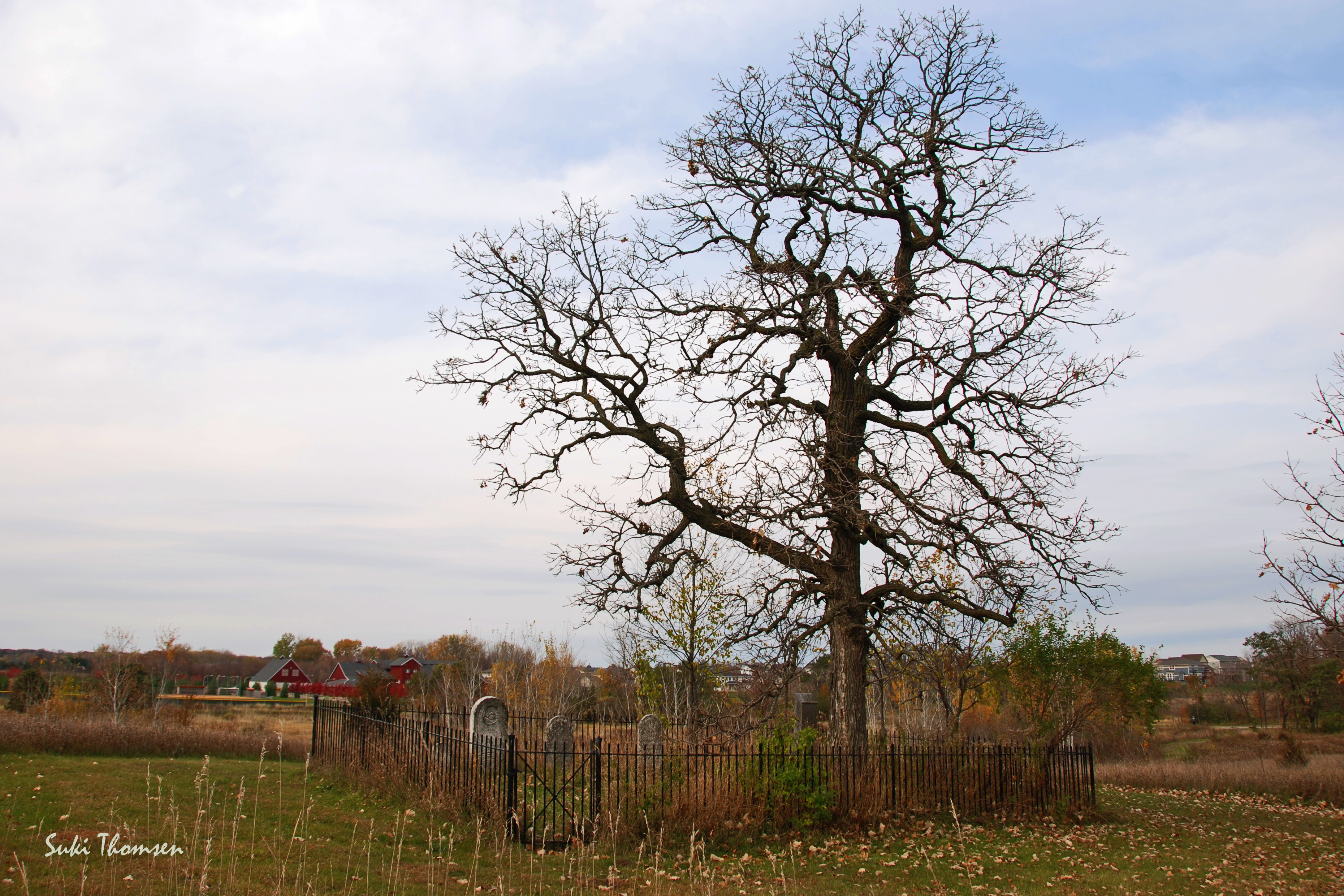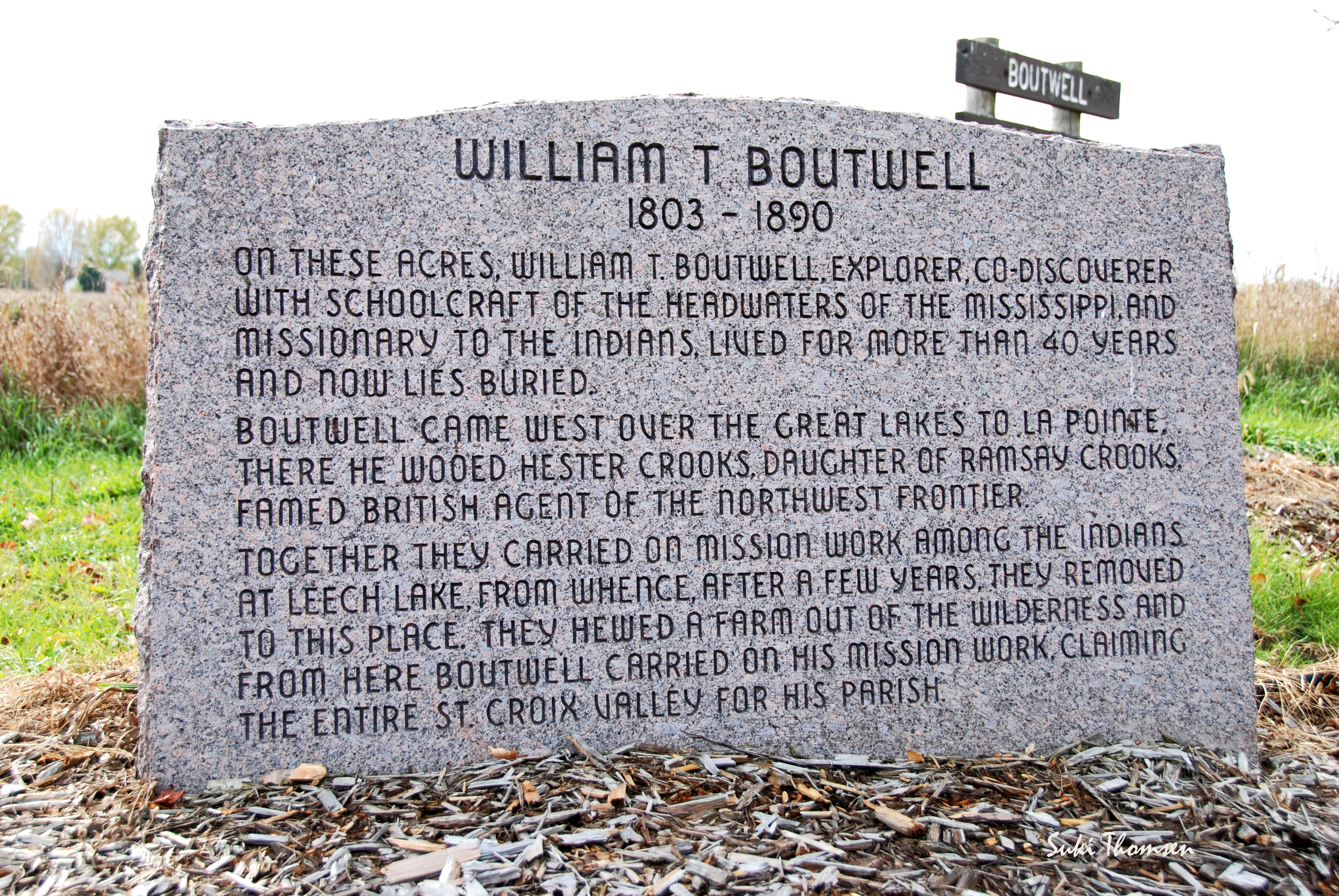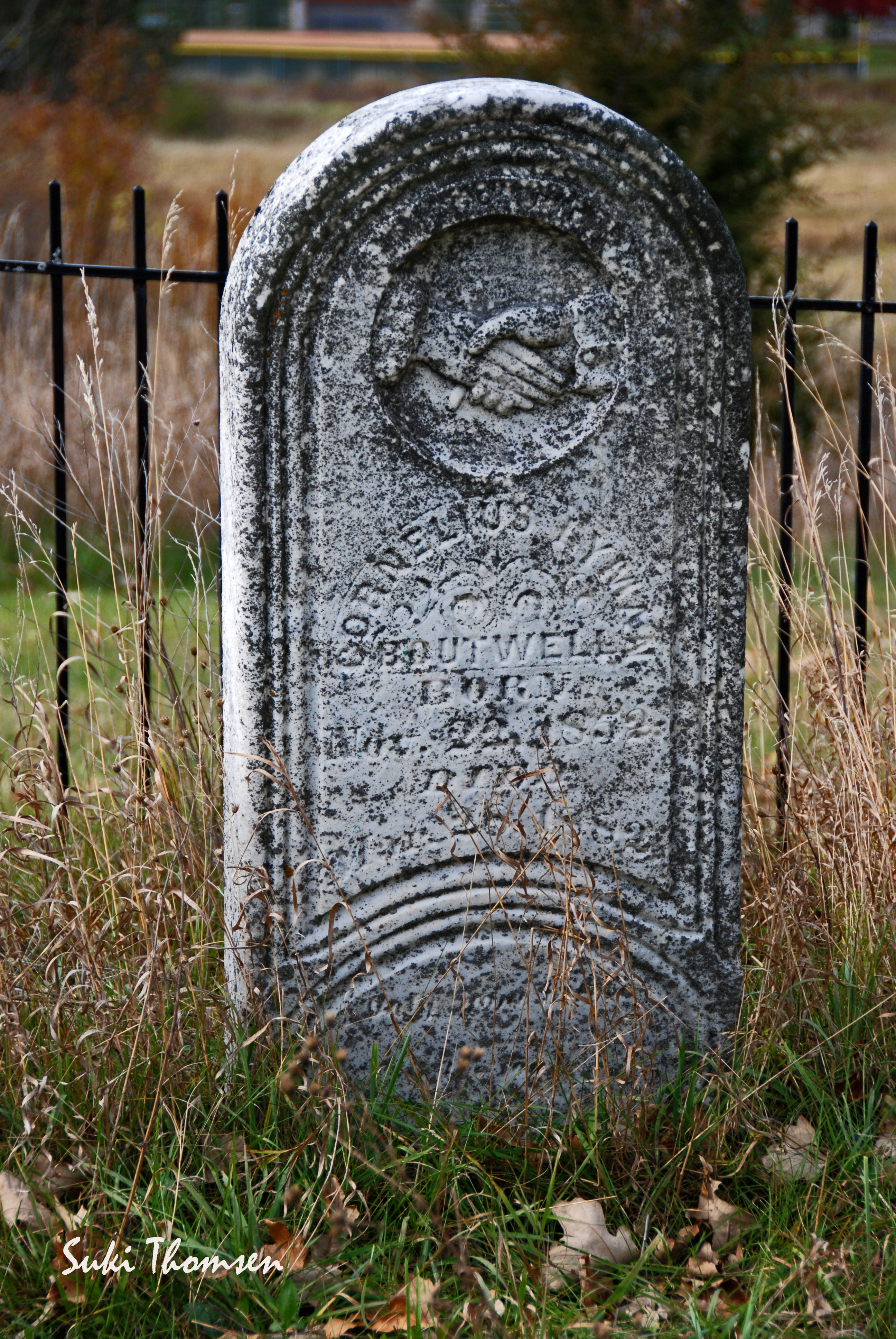Landmark Site
Boutwell Family Cemetery
Boutwell Cemetery is located across the road from the Rev. William Boutwell’s second house on his homestead in Stillwater Township. The cemetery is owned by the Washington County Historical Society and is surrounded by Boutwell’s former farm fields, now a Stillwater park. The private and rather isolated site reflects the Boutwell family’s challenges in early Stillwater settlement history.
William Thurston Boutwell and his first wife, Hester Crooks Boutwell, are familiar figures not just in Stillwater, but also in early state history. Boutwell, a Presbyterian missionary educated at Andover and Dartmouth, was a significant member of the missionary contingent in the northwest Indian nations, including the Ojibway settlements at Leech Lake. He was a member of the exploratory party which located the sources of the Mississippi and named Lake Itasca. In 1834, he married Hester Crooks, the daughter of fur trader Ramsey Crooks and an Ojibway mother.
Hester was a well-educated woman who contributed to missionary efforts and was a skilled partner in wilderness life. The two spent several years at the mission station at Pokegama,. She was well-known in both the mission and, later, Stillwater communities, and one (complimentary albeit patronizing) description recounts: "[She ] deserves honorable mention as the early companion of the devoted missionary. Her father gave her a superior education at Mackinaw mission. She was a woman of tall and commanding figure, her black hair and eyes indicating her Indian origin. She was a fluent conversationalist, and careful and tidy in her personal appearance." A letter attributed to William also extolled her skills:
"She has exceeded my highest expectations in culinary affairs and given me more
than one specimen of real New England bread. She is not ashamed to work and is always at something. When nothing calls for the employment of her hands, she is reading, writing or translating, and thus improving herself or endeavoring to benefit others. To speak plain, she is deserving a better husband than I was ever made to become. She is all and more than I expected in her or any wife."
The Boutwells had nine children, some of whom died at young ages. Their first children were born in northern Minnesota, and, reflecting perhaps the hardships of this life, a son was permanently consigned to the care of Boutwell's brother and wife during a visit to New Hampshire in 1840. Almost forty years passed before the son was reunited with his father and family.
As the relationships between the Indian nations, settlers and missionaries grew more tense, the Boutwells finally relocated to the Stillwater area in 1847. Boutwell traveled throughout the St. Croix Valley, establishing churches and preaching in many locations. In 1848 he reflected on his new situation: "It is a year last June since I left the Indians and came on to the St. Croix. In looking over this rural waste, the first dictate of duty seemed to be to take a point from which you can reach its two extremes. Here I have preached half of the time, and the other half twelve miles north at the Marine Company's lumbering establishment."
Boutwell purchased the claim originally belonging Rutherford township pioneer William Vail, and built a house. Undated and abbreviated notes from an interview with Boutwell, conducted by J. F. William (and housed at the Minnesota Historical Society) shed a bit of light on how an itinerant missionary minister could manage such an investment:
"June 47 came to St. Croix Stillwater Tp Rutherford set. Made a claim- built this house, and began life as a farmer. My wife's moth was a half breed wife of Ramsey Crooks. ... we came here I hadnt a cent all half brd recd annuities- their funds. ... - with that money I bot lumber + built this house. I [acquired] Land 160 acres my 2 oldest boys helped me some about farm life my father furnished money to pay for it..."
Boutwell's farming endeavors were hampered by an injury he received in 1850 when traveling by horseback to a church service. J. F. William noted:
"ride in spring. Horseback travel- came to one where ice had... Honeycomb. Jilted on horn of saddle, - ruptured rode 6 miles preached Sunday got on horse again. ...pain...Went to a Dr- "you are ruptured" sed I [had] 2 get a Truss. Could not lift anything had much trouble for years- rupture got worse- nearly died once or twice could not work on my farm much..."
Whatever financial support Boutwell initially received was apparently a fine start in settlement life, and by 1870, Boutwell's personal property and real estate holdings were significant. The 1870 census lists the following assets:
Acres of land:
Improved 100
Woods: 40
Other: 160
Cash value of farm: $9720
Of equipment: $400
Total amt of wage paid during the year: $300
Horses: 5
Milch cows: 2
Other Cattle: 7
Working oxen: 0
Sheep:0
Swine: 3
Value of all livestock: $1070
Regular wheat: 300
Winter: 0
Corn: 200
Barley: 400
Also on the Boutwell land was the Boutwell Cemetery, now a Stillwater park . The first to be interred on the site near the home was infant Basie Ernst, in 1851. Hester died at the age of 36 in 1853 and was buried next to her son.
William Boutwell married Mary Ann Bergin in 1854, and Mary Ann was buried in the cemetery as well upon her death in 1868. A second son, Cornelius Lyman, age 29, was buried in 1882.
As time passed, much of the farm work was done under the supervision of Edward Jones, husband of daughter Kate Boutwell. The Jones purchased the farm in 1876 and local history accounts report that they constructed a new house in 1880, where William lived until 1890 under Kate's care.
On October 13, 1890, the St. Paul Daily Globe reported:
"The funeral of Rev. William T. Boutwell will be held at 2 o'clock today from the residence in Stillwater town[ship], and the remains will be interred in the little plot opposite the house, beside the graves of deceased's two wives... Old settlers of the valley, including W. H. C. Folsom, of Taylor's Falls, will be chosen as pall-bearers, and, besides the officiating ministers, Revs. Neil, Whitney and Hall, several other clergymen will be in attendance."
Edward and Kate continued to operate the farm. After Kate's death in 1909, her son, Sterling, and wife Anna farmed until they sold the property to the John and Ottilla Everman family, with son Leonard Everman and wife subsequently occupying the homestead until 1947. (As an interesting side note, John Everman was born in Peru in 1858; his family was likely one of the early German immigrants responding to initiatives organized by the Peruvian government to encourage colonization of the central jungle, beginning in the early 1850s. The hardships of this endeavor meant many families soon emigrated elsewhere.)
Source(s): Erickson, Elizabeth B. "The Boutwell Cemetery." Minnesota Genealogist 1.2 (1970). Print.
Folsom, William H. C. "Fifty Years in the Northwest." The Online Books Page. Web. 22 Apr. 2011.
Washington County Parcel Identification Number (PIN): 3003020120001
Common Property Name: Boutwell Family Cemetery
State Historic Preservation Office Inventory Number: WA-SWC-1488
Construction Date: 1851
Architectural Style: Unknown



